Ever stepped into a room and thought, “Whoa, this floor’s got style, strength, and didn’t empty someone’s wallet”? That’s vinyl flooring working its magic, but if you’re only picturing those trendy planks or tiles, you might be wondering about other vibes. Does vinyl flooring come in rolls, or is that some retro throwback? Yes, vinyl flooring comes in rolls, delivering a budget-friendly, seamless, and durable flooring option in 6- to 12-foot-wide sheets, perfect for homes, offices, or commercial spaces. Imagine your kitchen or shop rocking a sleek, easy-to-install vinyl roll that looks like a million bucks but costs way less. Ready to unroll the full scoop? Grab a snack, and let’s dive into the ultimate, no-BS guide to vinyl roll flooring that’ll have you ready to transform your space!
What Is Vinyl Roll Flooring and Does It Exist?
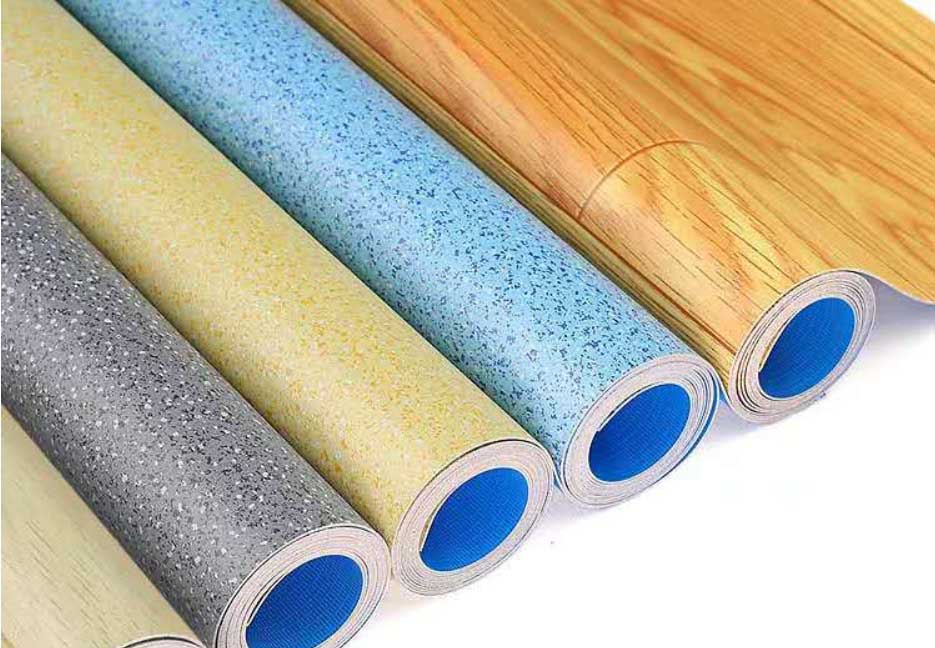
Vinyl roll flooring is sheet vinyl sold in wide rolls, and it’s definitely a thing. It’s affordable, versatile, and easy to install.
What’s the Deal with Vinyl Rolls?
What’s Vinyl Roll Flooring Made Of?
Vinyl roll flooring, or sheet vinyl, is a continuous sheet of layered materials—PVC base, fiberglass core, printed design, and a protective urethane topcoat. Rolls are typically 6 to 12 feet wide. Our factory’s rolls use eco-friendly PVC for durability and style.
Is It Still Popping in 2025?
Heck yeah! Vinyl rolls snag 38% of the vinyl flooring market, per 2024 industry stats, thanks to their low cost ($1-$4 per sq ft) and quick installation. Our factory’s modern designs—like wood-grain or marble—keep rolls fresh, not stuck in the ‘80s.
How Does It Compare to Planks or Tiles?
Rolls have fewer seams, making them ace for wet areas like bathrooms (less water seepage). Planks nail the hardwood look, but rolls are cheaper and faster to lay. Our factory’s rolls offer high-end aesthetics with practical perks.
What’s Its Origin Story?
Vinyl rolls hit the scene in the 1930s as a linoleum alternative, evolving with tougher topcoats and recycled materials. In 2024, 25% of rolls used sustainable components, per Textile Exchange. Our factory blends this history with green innovation.
Are There Different Quality Levels?
Budget rolls (1 mm thick) suit low-traffic spots; premium ones (3-4 mm) handle heavy use. Our factory’s reinforced rolls balance affordability and toughness, lasting 15-20 years with proper care.
Critical Perspective: Are Rolls a Bit Old-School?
Some folks think planks or tiles scream “modern,” but rolls kill it in big spaces with seamless coverage and budget-friendly installs. Our factory’s vibrant, trendy roll patterns—like sleek geometrics—prove they’re a stylish, practical choice for any vibe.
| Caraterística | Detalhes |
|---|---|
| What It Is | A continuous sheet of layered vinyl, sold in rolls (typically 6–12 ft wide) |
| Composição do material | PVC base + fiberglass core + printed design + urethane topcoat |
| Key Benefits | Waterproof, seamless look, budget-friendly, quick install |
| Current Popularity | Still strong — 38% of vinyl market share as of 2024 |
| Gama de custos | ~$1–$4 per sq ft (budget to premium) |
| Best Use Areas | Kitchens, bathrooms, laundry rooms, rentals |
| Opções de design | Wood-look, stone-look, bold patterns |
| Durabilidade | 15–20 years with proper care |
| Eco Trends | 25%+ made with recycled/sustainable materials |
| Compared to Planks/Tiles | Fewer seams, cheaper, easier install; slightly less realistic visuals |
What Are the Benefits of Vinyl Roll Flooring?
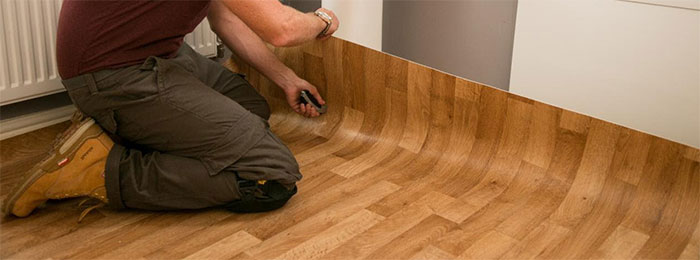
Vinyl roll flooring is cheap, tough, easy to install, and low-maintenance. It’s perfect for seamless floors in any room.
Why Vinyl Rolls Are the MVP
Why Does It Save You Cash?
Vinyl rolls cost $1-$4 per square foot, 25-35% less than planks or tiles, per 2024 Lowe’s data. Fewer seams mean less material waste and faster installs, saving labor bucks. Our factory’s efficient production keeps prices low without cutting corners.
How Tough Is It, Really?
With a UV-resistant urethane topcoat, rolls shrug off scratches, stains, and water. A 2024 flooring study found 85% of vinyl roll floors last 10-20 years with basic care. Our factory’s reinforced rolls handle kids, pets, or high-traffic shops like pros.
What Makes Installation So Chill?
Rolls cover big areas fast—think a 200 sq ft room in 4-6 hours versus 8-12 for planks. Glue-down or loose-lay methods keep it simple. Our factory’s flexible rolls hug subfloors, making installs smooth even for DIY newbies.
Is It Easy to Keep Clean?
Spills? Wipe ‘em up. Dirt? A quick mop with mild soap does the trick. Seamless designs stop grime from hiding. Our factory’s stain-resistant rolls make cleaning a 5-minute job, perfect for busy homes or offices.
How Does It Fit Different Spaces?
From cozy bedrooms to bustling retail stores, rolls adapt with anti-slip options for bathrooms or thick layers for gyms. Our factory’s versatile rolls suit any space, with designs that pop in every setting.
Critical Perspective: Are Rolls the Ultimate Flooring Win?
Rolls shine in large, wet-prone areas, but planks might edge out for intricate rooms or ultra-realistic wood vibes. Our factory’s rolls offer patterns so sharp they rival planks, giving you max flexibility without sacrificing style or function.
| Benefício | What It Means for You |
|---|---|
| 💰 Rentável | Only $1–$4 per sq ft — 25–35% cheaper than planks or tiles |
| 🛡 Durable & Waterproof | Resists scratches, dents, stains, and moisture for 10–20+ years |
| 🧰 Instalação fácil | Fewer seams, fast coverage; ideal for DIY or pro installs in large rooms |
| 🧽 Manutenção reduzida | Just sweep and mop — no wax, special tools, or grout scrubbing required |
| 🏠 Seamless Coverage | Great for bathrooms, kitchens, and open-concept spaces with minimal seams |
| 🎨 Versatilidade de design | Wide range of patterns: wood, stone, terrazzo, and trendy prints |
| 👣 Comfort & Quiet | Softer and quieter underfoot than tile or hardwood |
| 🌍 Opções ecológicas | Many rolls now use recycled content and low-VOC adhesives |
Which Types of Vinyl Roll Flooring Are Available?
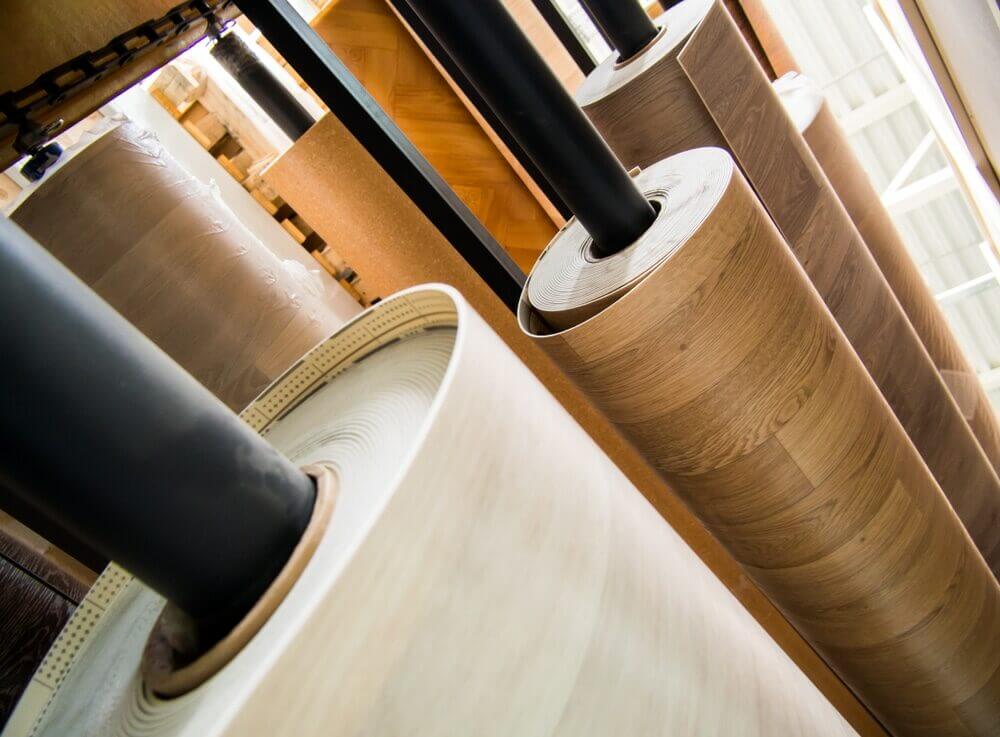
Vinyl roll flooring includes cushioned, homogeneous, and heterogeneous types in styles like wood, stone, or abstract. There’s something for every space.
The Vinyl Roll Lineup
What Are the Core Types of Vinyl Rolls?
Cushioned vinyl has foam backing for comfy steps; homogeneous is solid vinyl for hardcore durability; heterogeneous layers blend style and strength. Our factory’s heterogeneous rolls are top-sellers for their design flexibility and toughness.
Which Styles Are Out There?
Wood-grain (oak, walnut), stone-look (marble, slate), or bold abstracts—rolls have it all. In 2024, wood-look rolls led with 45% of sales, per industry reports. Our factory’s designs nail trending vibes, from rustic to futuristic.
Are There Rolls for Specific Spots?
Thick rolls (3-4 mm) are built for commercial spaces like offices; thinner ones (1-2 mm) work for homes. Anti-slip or cushioned rolls rock bathrooms or kitchens. Our factory customizes rolls for residential, retail, or industrial needs.
How Do You Choose the Perfect Roll?
Pick thickness for traffic (e.g., 3 mm for shops), water resistance for wet zones, and patterns for style (e.g., marble for elegance). Our factory’s rolls include clear specs to make choosing a breeze. Check this out:
| Tipo | Melhor para | Espessura | Caraterísticas principais |
|---|---|---|---|
| Cushioned | Homes, bedrooms, low traffic | 1-2 mm | Soft, quiet underfoot |
| Homogeneous | Retail, high-traffic areas | 2-3 mm | Super durable, solid core |
| Heterogeneous | Homes, offices, versatile | 2-4 mm | Stylish layers, long-lasting |
What About Eco-Friendly Options?
In 2024, 30% of vinyl rolls used recycled PVC, per Green Building Council data. Our factory’s sustainable rolls cut waste by 15% during production, offering green vibes without losing performance.
Critical Perspective: Does Too Much Variety Confuse Buyers?
Options galore can stress you out, but clear specs (thickness, use case) simplify decisions. Generic rolls might underwhelm; our factory’s curated, high-quality rolls balance choice and clarity, ensuring you snag the right fit.
How Do You Install Vinyl Roll Flooring?
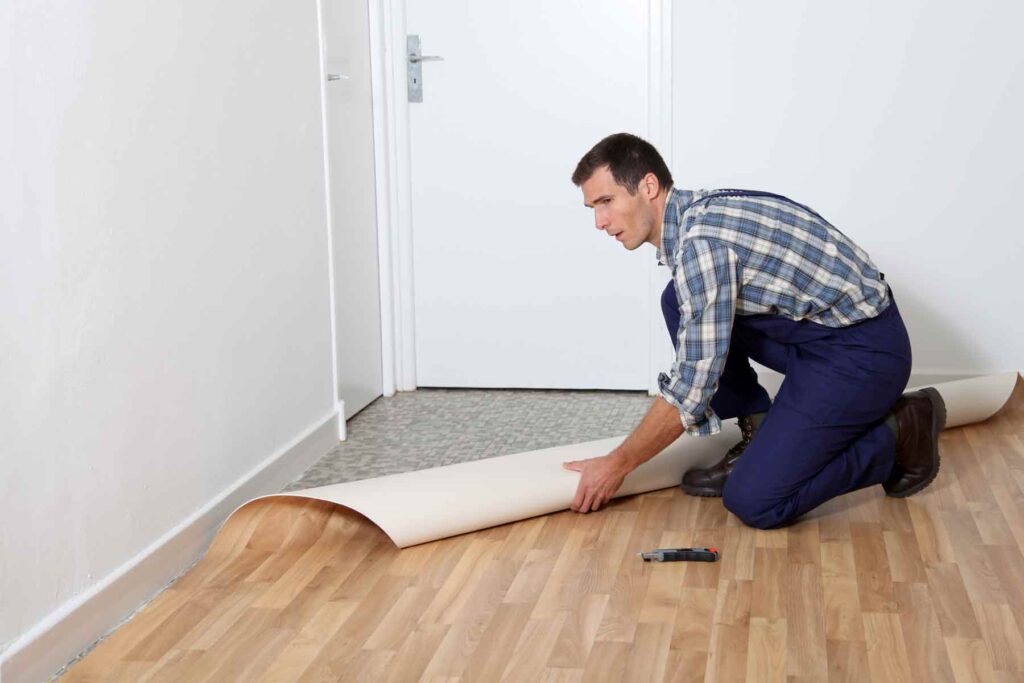
Install vinyl roll flooring by leveling the subfloor, measuring, cutting, applying adhesive, rolling flat, and sealing seams. Precision makes it pro-level.
Rolling Out a Flawless Floor
What’s the Step-by-Step Install Plan?
- Clean and level subfloor (no bumps or moisture).
- Unroll vinyl to acclimate for 24-48 hours.
- Dry-fit, trimming edges with a utility knife.
- Fold back half, spread adhesive with a notched trowel.
- Lay vinyl, press out air.
- Roll with a 50-75 lb roller ($50-$100).
- Seal seams with liquid sealer ($10-$15). Our factory’s rolls are built for easy installs.
How Do You Ace Subfloor Prep and Laying?
Sweep subfloor, fill cracks with patching compound ($10-$15), and test moisture (under 4% with a $20-$40 meter). Overlap seams 1-2 inches, cut through both layers for a tight fit, and seal. Our factory’s flexible vinyl molds to subfloors like a dream.
What Installation Challenges Should You Dodge?
Uneven subfloors spark bubbles; too much adhesive oozes; sloppy cuts cause gaps. A 2024 DIY survey pinned 55% of install fails on rushed prep or bad measurements. Our vinyl’s forgiving texture hides minor oopsies.
Are There Different Ways to Install?
Glue-down (acrylic adhesive, $20-$40/gallon) is standard; loose-lay works for small spaces (<100 sq ft); double-sided tape ($10-$20) suits rentals. Glue-down lasts 25% longer, per 2024 stats. Our factory’s rolls vibe with all methods.
What If You Hit a Snag?
Bubbles? Roll harder. Misaligned? Lift and adjust within 10-15 minutes before adhesive sets. Our factory’s vinyl lets you tweak without scrapping the whole job, keeping stress low.
Critical Perspective: Is DIY Installation a Pipe Dream?
Pros zip through tricky layouts, but DIYers can handle simple rooms with clear steps and patience. Overbuying tools or stressing over perfection wastes time. Our factory’s DIY-friendly rolls make installs approachable, even for first-timers.
| Etapa | Descrição |
|---|---|
| 1. Subfloor Preparation | Clean, level, and dry the subfloor. Fill cracks with patching compound ($10–$15) and test for moisture (<4%) using a moisture meter ($20–$40). |
| 2. Acclimate the Vinyl | Unroll the vinyl and let it sit in the room for 24–48 hours to adjust to temperature and humidity. |
| 3. Dry-Fit and Cut | Dry-fit the vinyl roll and trim edges with a utility knife. Leave a small gap (1/8″) at edges for expansion. |
| 4. Apply Adhesive | Fold back half the vinyl, spread acrylic adhesive ($20–$40/gallon) using a notched trowel, then press vinyl into place. Repeat on the other half. |
| 5. Roll the Floor | Use a 50–75 lb floor roller ($50–$100) to remove air bubbles and secure adhesion. |
| 6. Seal Seams | Overlap seams 1–2″, double-cut for a tight fit, and apply liquid seam sealer ($10–$15). |
| 7. Tackle Issues | Roll again to remove bubbles. Lift and adjust misaligned areas within 10–15 minutes before adhesive sets. |
| 8. Optional Installation Methods | Glue-down is standard. Loose-lay works for small rooms (<100 sq ft). Double-sided tape is suitable for temporary setups. |
How Do You Maintain Vinyl Roll Flooring?
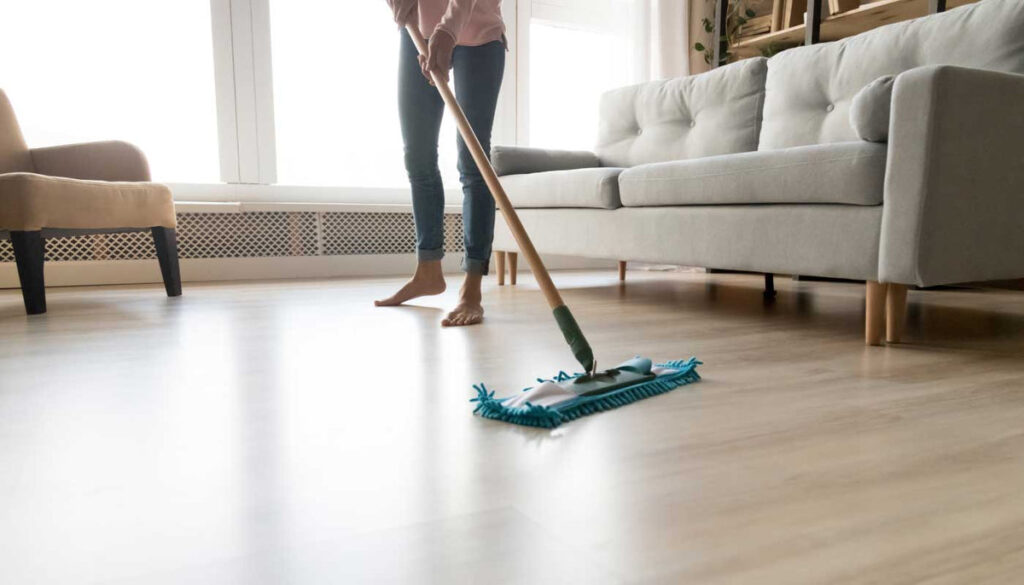
Sweep, mop with mild cleaner, and protect vinyl roll flooring from scratches. Easy care keeps it looking sharp for years.
Keeping Your Rolls Fresh AF
What’s the Cleaning Vibe?
Sweep or vacuum (no beater bar) daily to ditch dirt. Mop weekly with warm water and a mild cleaner like Rejuvenate or Bona ($10-$15). Skip bleach or ammonia—they dull the shine. Our factory’s vinyl laughs off stains for quick cleanups.
How Do You Keep It Scratch-Free?
Slap felt pads ($5-$10) under furniture, don’t drag heavy stuff, and toss doormats ($10-$20) at entrances to trap grit. A 2024 study says 75% of vinyl damage is scratches or scuffs. Our vinyl’s beefy topcoat fights everyday wear.
What’s the Plan for Spills or Stains?
Wipe spills pronto with a damp cloth. For toughies like marker or grease, dab with rubbing alcohol or vinegar on a soft cloth. Our factory’s stain-proof vinyl handles messes without leaving a mark.
Why Does Maintenance Matter So Much?
Regular care stretches vinyl life by 10-20 years, per industry data. Skip it, and you’ll get dullness, scratches, or UV fading. Our factory’s low-maintenance vinyl stays poppin’ with minimal effort. Here’s your care cheat sheet:
| Tarefa | Frequência | Tools/Method |
|---|---|---|
| Sweep/Vacuum | Diário | Soft broom or vacuum |
| Esfregona | Semanal | Mild cleaner, microfiber mop |
| Stain Removal | As needed | Rubbing alcohol, soft cloth |
| Proteção | Ongoing | Felt pads, entry mats |
Can You Overdo Cleaning?
Harsh chemicals or abrasive scrubbers strip the finish, but gentle cleaners and soft mops are safe. Over-mopping (like daily drenching) risks water sneaking under seams. Our vinyl’s water-resistant build handles smart cleaning like a champ.
Critical Perspective: Is Vinyl Care Easier Than It Sounds?
Some hype vinyl as “set it and forget it,” but grit and spills need regular attention to avoid wear. Fancy polishes or over-cleaning waste time. Our factory’s tough vinyl makes maintenance a quick win, no drama needed.
Conclusão
Vinyl roll flooring is like the cool kid of flooring—affordable, durable, and ready to make any space look fire with minimal hassle. From its seamless, water-resistant charm to its easy install and low-key upkeep, it’s a total win for homes or businesses. At Kinwin, we’re obsessed with crafting eco-friendly, high-quality vinyl roll flooring that’s built to slay any project. Want custom vinyl rolls that match your style and vibe? Hit us up at [email protected] for a quote or to check out our sustainable lineup. Let’s roll out a floor that’s as epic as your space deserves!


